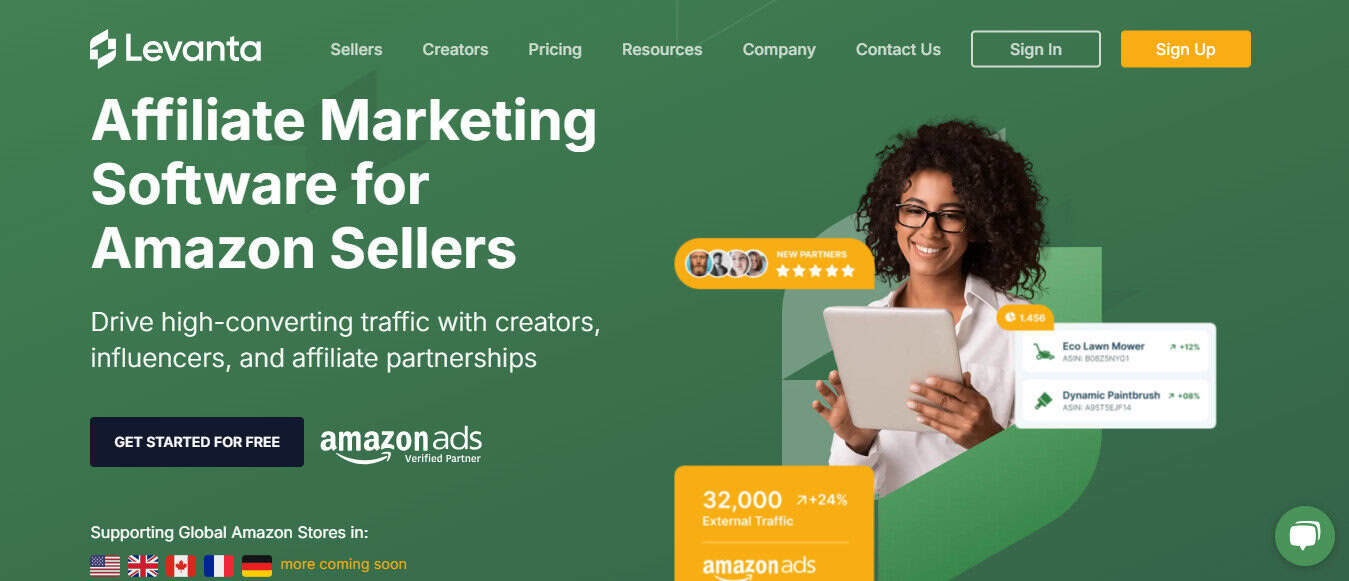Last Updated on February 26, 2026 by Ewen Finser
I know firsthand from my work in affiliate marketing that LTK is a great influencer and affiliate marketing platform, but it’s not for everyone, and it’s certainly not for every brand.
When I had to find a more budget-friendly option for my influencer program, I collected my research and am happy to share it with you here, now!
These are the 7 best LTK alternatives for brands.
The Short List:
If you’re looking for the right alternative to LTK for your brand, the best choice depends on your goals and your brand, whether you’re an Amazon creator, a fast-growing e-commerce brand, or a global enterprise.
Here are the top alternatives to LTK I recommend, each best for different business needs and strategies.
- Levanta- Best for Amazon brands looking to work with 10K+ influencers
- Grin– Best for e-commerce brands working with direct-to-consumer (DTC) influencers
- Upfluence– Best for mid-to-large businesses wanting an all-in-one influencer marketing suite
- Julius– Best for agencies and large brands that need detailed influencer analytics
- Tagger- Best for data-driven influencer marketing and global brands
- Aspire.io– Best for growing e-commerce brands working with user-generated content and creators
- Traackr– Best for enterprise brands prioritizing influencer brand alignment and compliance
What to Look for in an Alternative to LTK

The right LTK alternative for you depends on your specific business needs and goals.
Here are a few features and considerations to keep in mind when finding the right fit:
- Influencer Discovery & Vetting- Look for platforms with specific search tools and audience analytics to find creators who will fit your brand well.
- Campaign Management Tools- The right alternative should make it easy to organize outreach, gifting, contracts, and deliverables in one place.
- Performance Tracking & ROI- Seek out platforms that offer clear and organized reporting, sales tracking, and affiliate performance data.
- E-commerce & CRM Integrations- Easy connections with platforms like Amazon, Shopify, WooCommerce, or HubSpot help centralize influencer workflows.
- Scalability & Support- The tool should be able to adjust to your needs and offer reliable support when things get complex.
The 7 Best LTK Alternatives for Brands
Here are the 7 best alternatives to LTK for brands on Amazon and beyond.
1. Levanta
Best for Amazon influencers and brands selling on Amazon
Levanta is built specifically for the Amazon creator and brand community, with a focus on helping influencers and brands monetize Amazon storefronts and affiliate content.
It tracks influencer sales directly on Amazon and shows you which creators have the best affiliate sales records. If you’re selling on Amazon or working with creators who are, this is a niche but powerful tool.
Why I like it: Levanta fills a huge gap in the influencer space: Amazon performance tracking across Amazon Attribution and Creator Connections (CC). I’ve used it to see what kind of ROI I’m actually getting from creators, which is tough to track on Amazon. The interface is clean, and the attribution data is super clear. If your focus is on Amazon, it’s a no-brainer.
Price: Starts at $750/month (annual contract required)
Levanta assembled this report to help digital merchants navigate the new AI-shaped buying journey. Discover why creators now drive the clicks AI can’t and how to turn that into revenue.
Pros
- Super niche and effective for Amazon
- Tracks sales directly from influencer links
- Perfect for affiliate content
- Clear ROI tracking
- Easy setup and onboarding
- Access over 10K vetted influencers and affiliates for product promos
- United robust reporting for Amazon Attribution and Creator Connections
Cons
- Only for Amazon-related campaigns
- Limited creative management tools
- Not ideal for non-Amazon influencer efforts




Features
- Amazon storefront integration
- Influencer sales attribution
- Creator discovery by category and follower count
- Real-time reporting dashboard
- Affiliate link management for Amazon
- Payments & 1099 Automation
- Easy creator management
Check out our full Levanta review to learn more: My Honest Levanta Review
2. Grin
Best for DTC brands managing creator relationships
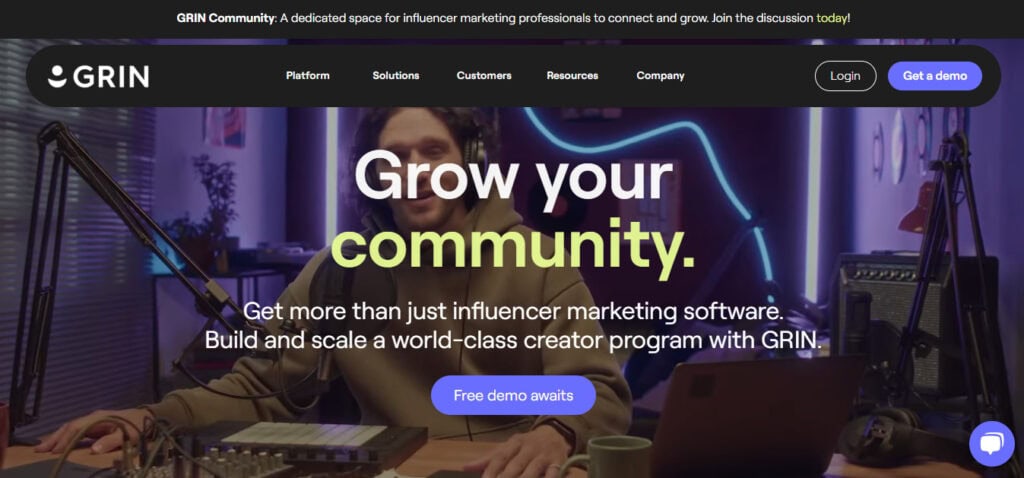
Grin is a full-scale influencer relationship management (IRM) tool designed to help ecommerce brands own their creator collaborations. It connects directly with whatever e-commerce platform you’re using to let you manage seeding, gifting, discount codes, and UGC from one hub.
If you care about long-term relationships with influencers, this is the platform you should be using.
Why I like it: Grin feels like a CRM for influencers, which I love. The Shopify and other e-commerce integrations make product gifting easier, and I’ve found it’s great for building ambassador programs. I appreciate that it’s focused on helping brands build direct relationships instead of relying on a marketplace. It’s my go-to when I want more control.
Price: Customizable, from $2,500
Also read: Top 8 Grin Alternatives for Influencer Marketing in 2025
Pros
- Great for managing ongoing relationships
- Great ecommerce integrations
- Scales well as you grow
- Solid UGC management
- Built for long-term brand building
Cons
- Not ideal for one-off campaigns
- Pricey for small brands
- Lacks a creator marketplace for quick discovery
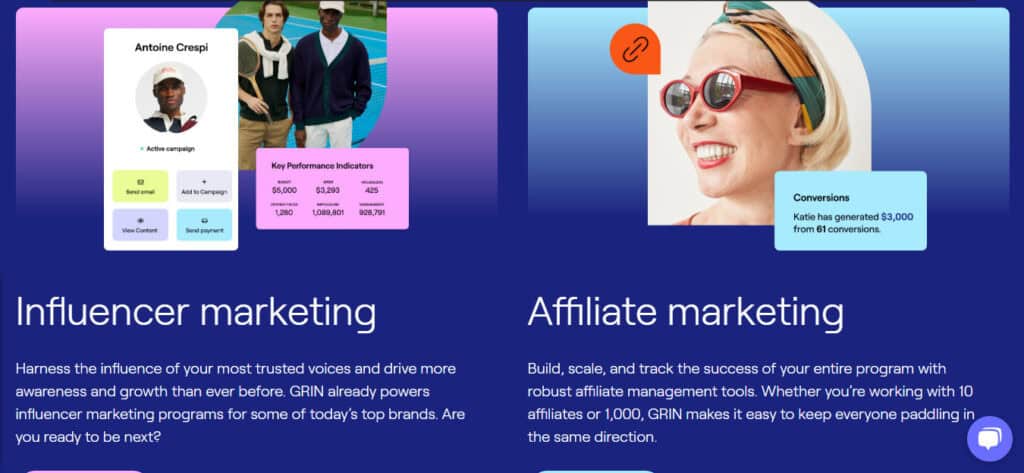
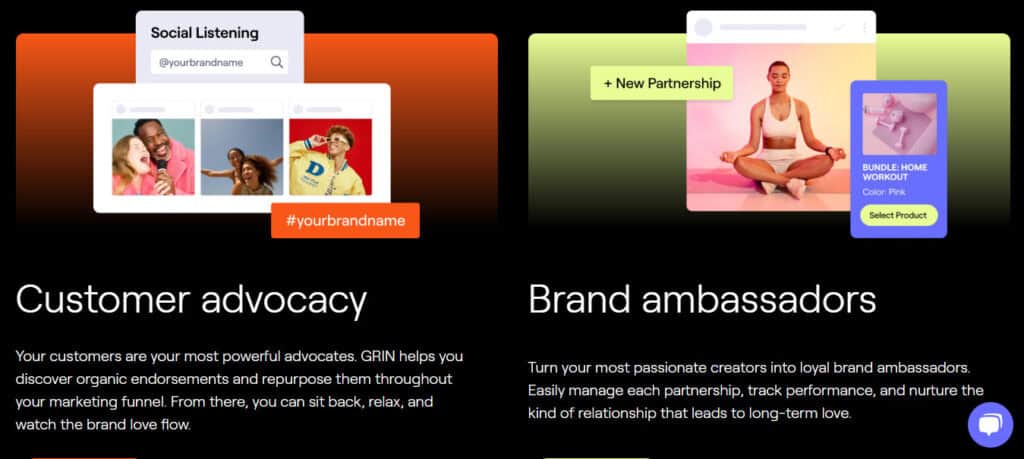
Features
- Influencer CRM
- Shopify & WooCommerce integration
- Product seeding management
- Affiliate tracking and commission payouts
- UGC content library
- Creator outreach and vetting tools
- Reporting dashboards
3. Upfluence
Best for mid-to-large brands running multiple campaigns
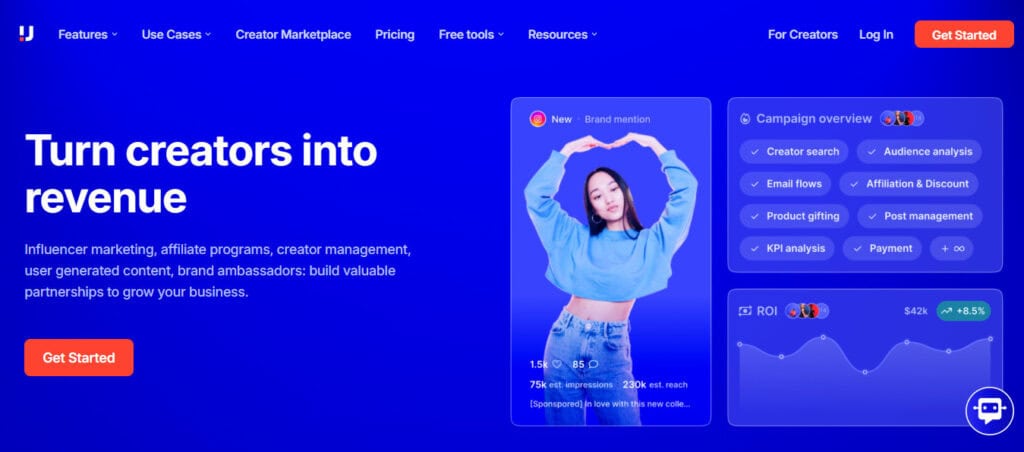
Upfluence is a great all-in-one solution that helps brands find influencers, track performance, and handle affiliate payments all in one place.
It’s built to work with e-commerce platforms, CRMs, and ERPs, so it fits your existing workflows. It’s best for teams who need full campaign support and reporting.
Why I like it: Upfluence feels like enterprise software in influencer form. It’s got all the tools you need, from influencer search to ROI reporting. I like that it works well for hybrid brands that sell both DTC and wholesale.
Price: Custom
Pros
- Extremely feature-rich
- Good for affiliate-heavy campaigns
- Strong vetting and discovery tools
- Works globally and in multiple languages
- Integrates into enterprise tech stacks
Cons
- Can feel overwhelming at first
- Onboarding takes time
- Higher price point than most
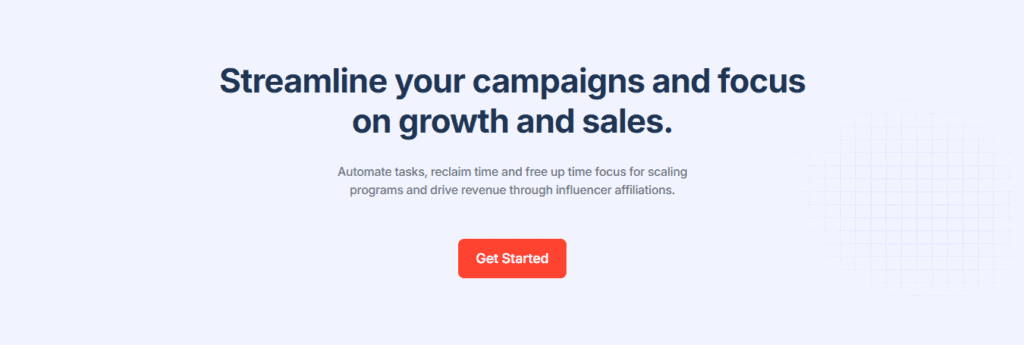
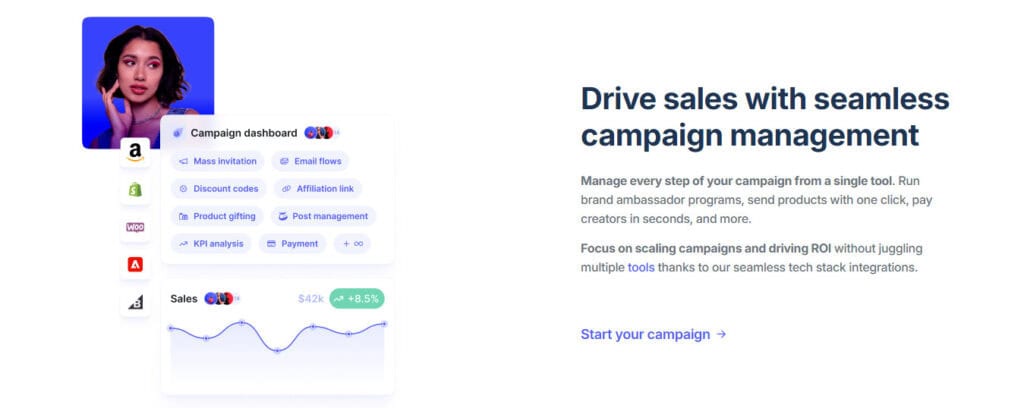
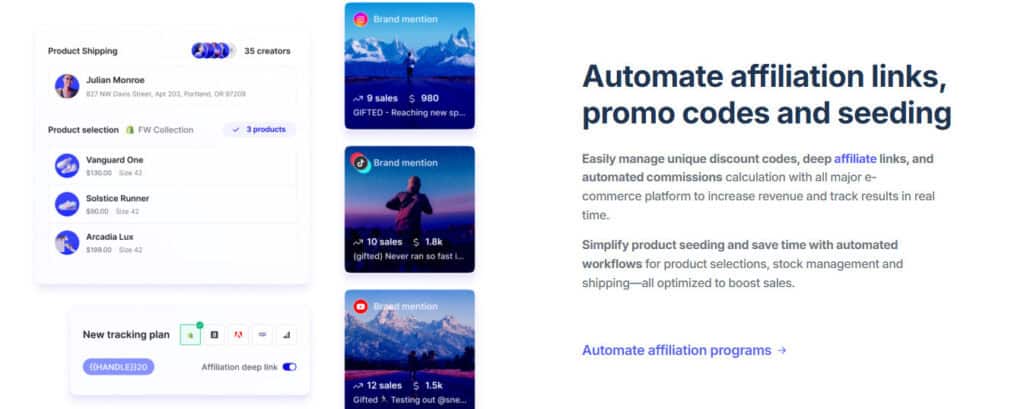
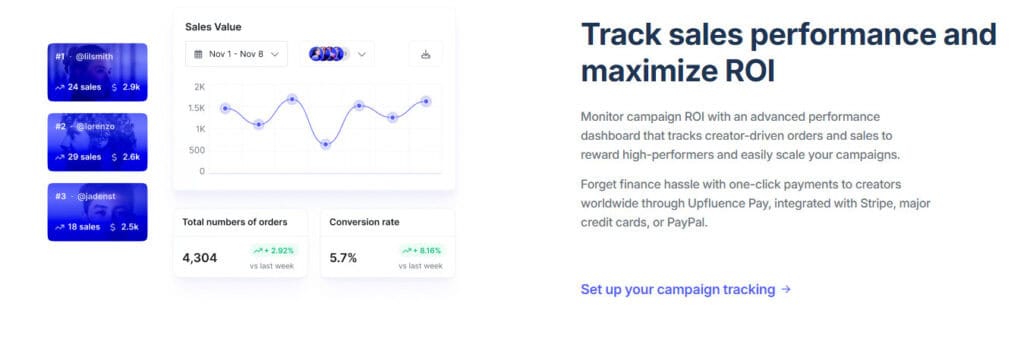
Features
- Influencer search and vetting
- Affiliate tracking and commissions
- Campaign workflow automation
- Social listening and sentiment analysis
- Shopify & CRM integrations
- Multi-language support
- Advanced reporting suite
4. Julius
Best for brands focused on detailed influencer data
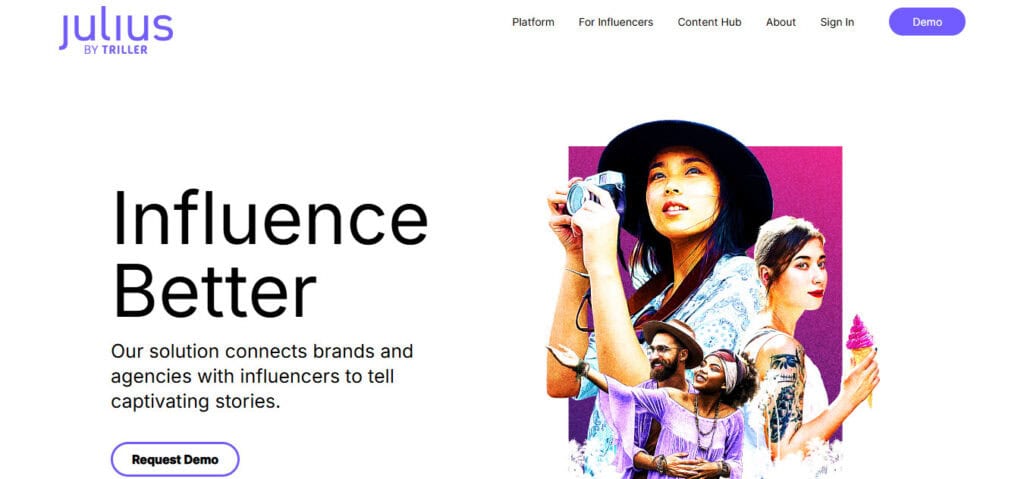
Julius is all about influencer insights like demographics, engagement, past brand deals, and audience quality. It’s used by agencies and big brands that want to do their homework before spending a dollar. It’s not built for ecommerce-specific workflows, but it’s amazing for targeting.
Why I like it: Julius makes it easy to avoid bad spending. I’ve used it when working with clients in niche markets who need really specific audience targeting. The amount of data it provides is unmatched, making it perfect for highly strategic campaigns.
Price: Custom
Pros
- Advanced influencer search
- Audience-first approach
- Great for niche targeting
- Easy to compare influencers
- Ideal for agencies
Cons
- Lacks ecommerce-specific tools
- Overkill for small campaigns
- Higher price tag
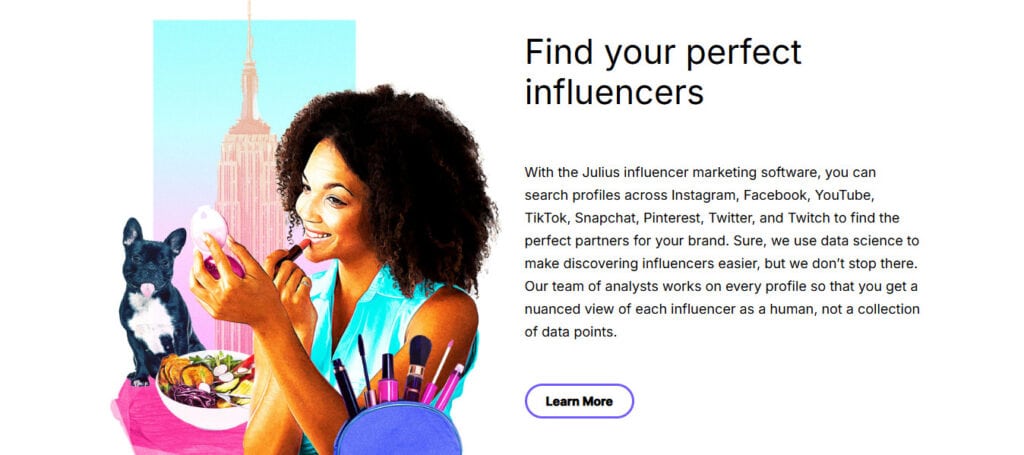
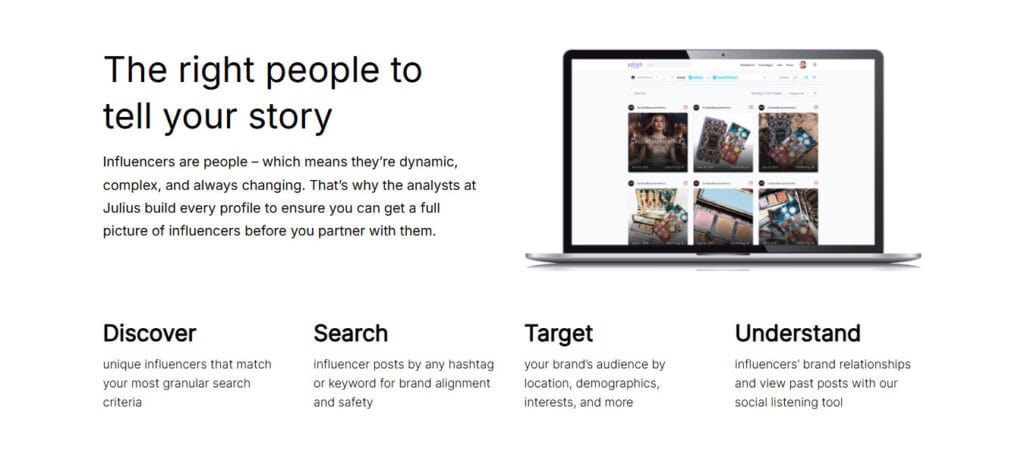
Features
- In-depth influencer profiles
- Audience demographic breakdowns
- Past brand partnership history
- Competitor tracking
- Campaign planning and messaging tools
- Analytics and performance tracking
- CRM-style contact management
5. Tagger
Best for data-driven agencies and social media teams
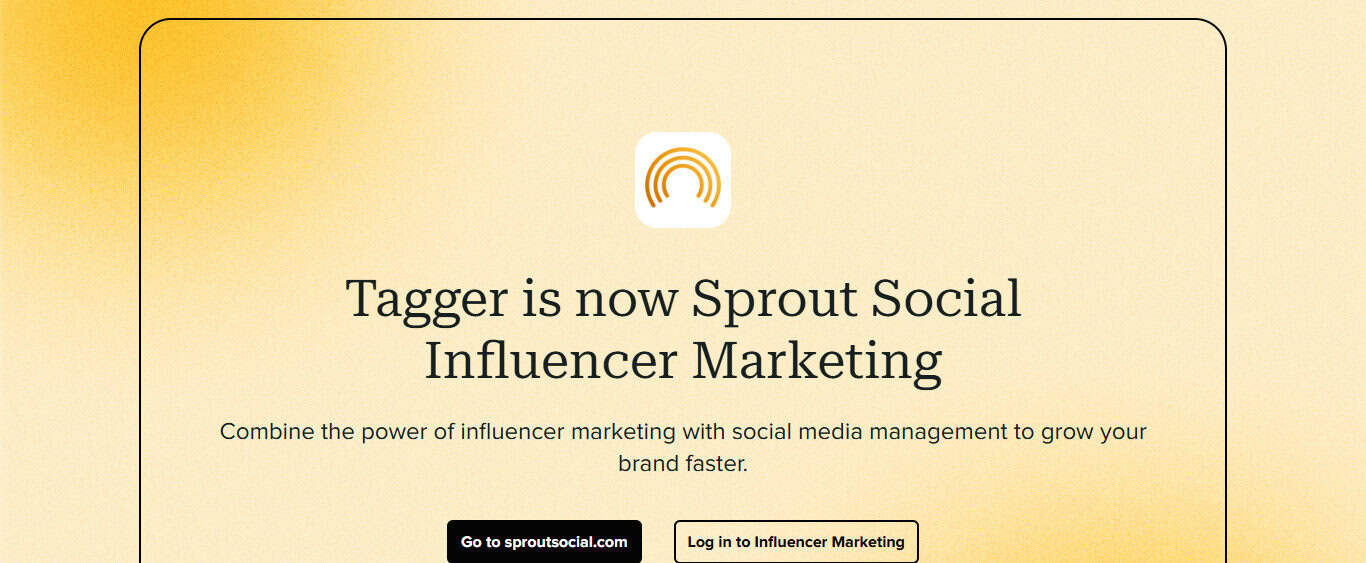
Tagger is built for teams that really want to dig deep into analytics and performance. Now part of Sprout Social, it includes advanced reporting, social listening, and smart discovery tools. This one is ideal for agencies managing multiple clients that also need proof of performance constantly.
Why I like it: Tagger’s data is next-level. I’ve used it on campaigns where reporting mattered as much as the content itself. It’s the kind of platform that makes your spreadsheets obsolete (in the best way!) and is built for teams who need to justify every dollar spent.
Price: From $199 per month.
Pros
- The most comprehensive analytics and insights
- Social listening is a huge benefit
- Trusted by agencies
- Great for multi-client reporting
- Integrates with Sprout Social
Cons
- Overkill for small brands
- Learning curve
- Pricey



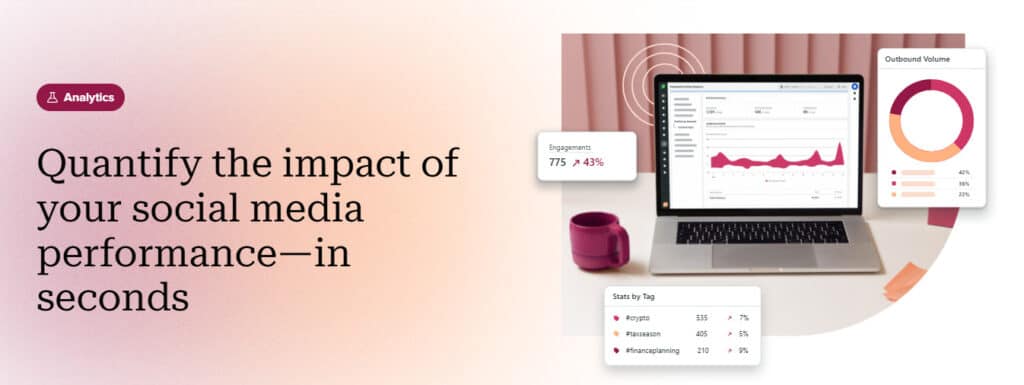
Features
- Influencer discovery with predictive analytics
- Social listening and trend tracking
- Campaign benchmarking
- Custom reporting dashboards
- Competitive brand tracking
- Cross-platform performance data
- Exportable white-label reports
6. Aspire.io
Best for DTC brands doing product seeding and UGC campaigns
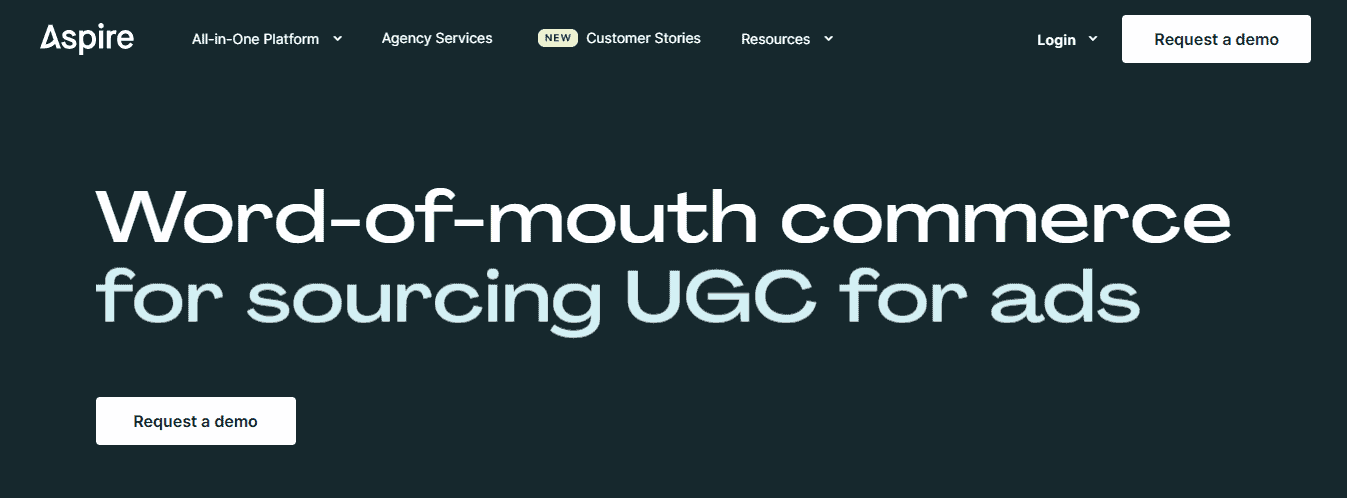
Aspire.io is a favorite among DTC brands in industries like fashion, wellness, and beauty. It’s built to help you run product gifting campaigns, manage UGC content, and scale influencer collaborations easily and all in one place. It works best with lifestyle creators and is perfect for visual campaigns.
Why I like it: Aspire makes it ridiculously easy to send products out and track content coming back. I’ve run UGC-heavy campaigns that could’ve been chaos without a tool like this. Their campaign templates are helpful, and it just generally makes you feel organized. If you’re gifting or seeding, you should start here.
Pros
- Designed for creator collabs at scale
- Perfect for UGC-heavy brands
- Streamlined gifting system
- Great onboarding experience
- Affordable for mid-sized teams
Cons
- Limited analytics depth
- Affiliate tracking isn’t its strength
- Better suited for consumer brands
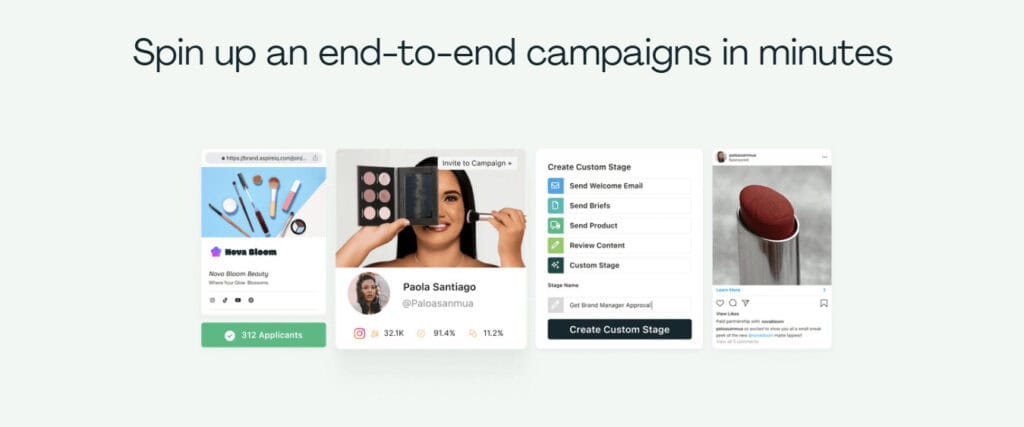
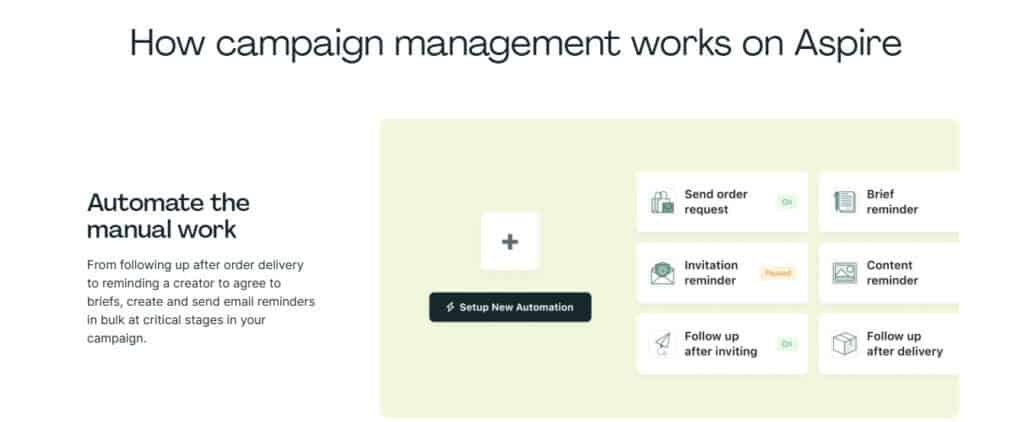
Features
- Product gifting workflows
- UGC management
- Creator application portal
- Campaign automation
- Built-in content rights management
- Customizable campaign templates
- ROI tracking tools
7. Traackr
Best for global brands and regulated industries
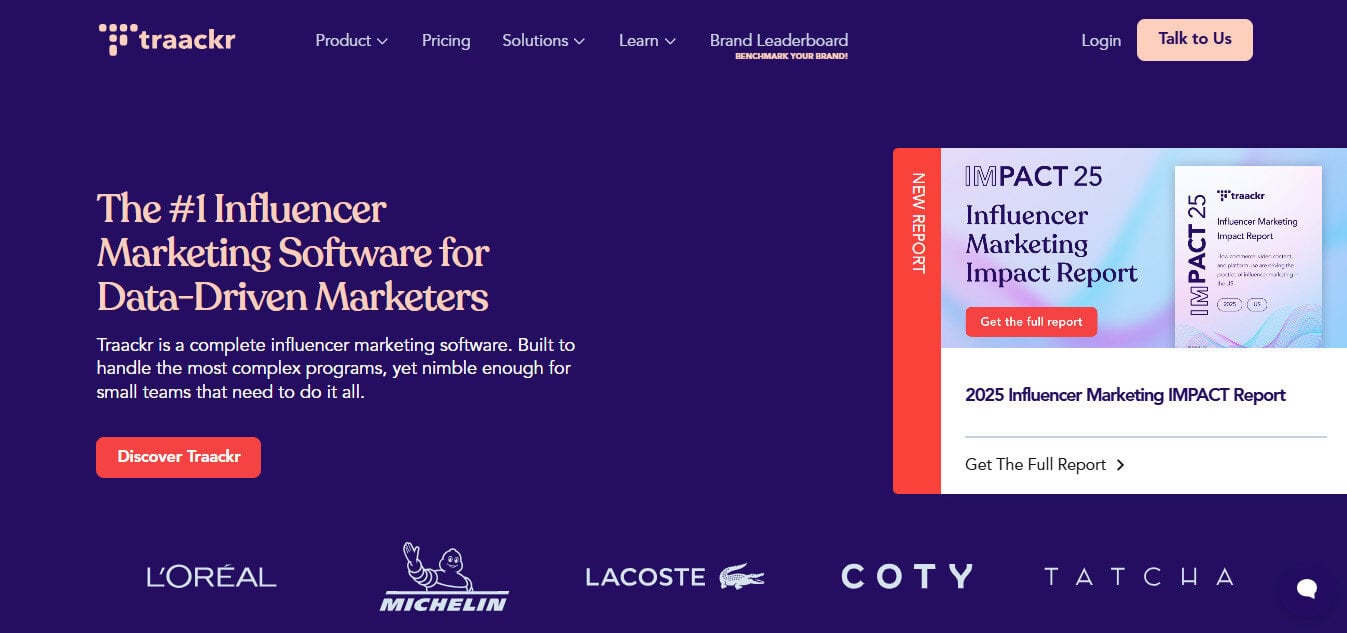
Traackr is an influencer marketing platform that focuses on brand safety, compliance, and strategic insights. It’s used by brands in industries like beauty, pharma, and other regulated spaces where vetting and ROI tracking matter most. If you need to prove value at the executive level, this is your platform.
Why I like it: Traackr is influencer marketing for serious brands. I used it on a campaign for a highly regulated client and it made compliance so much easier. Their spend tracking tools are also excellent. It’s not flashy, but it’s powerful.
Pros
- Great for regulated industries
- Helps prove long-term ROI
- Keeps the brand in alignment
- Solid compliance and brand safety features
- Supports international teams
Cons
- Expensive
- Not great for small brands
- Interface not as sleek
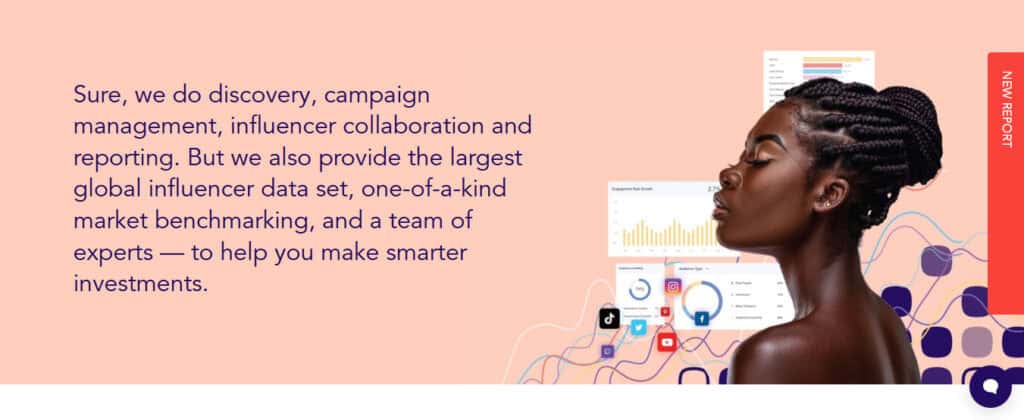
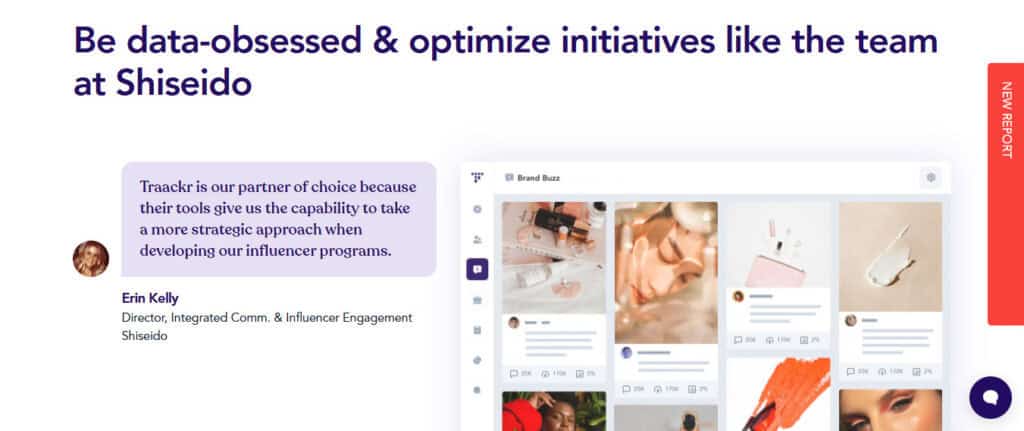
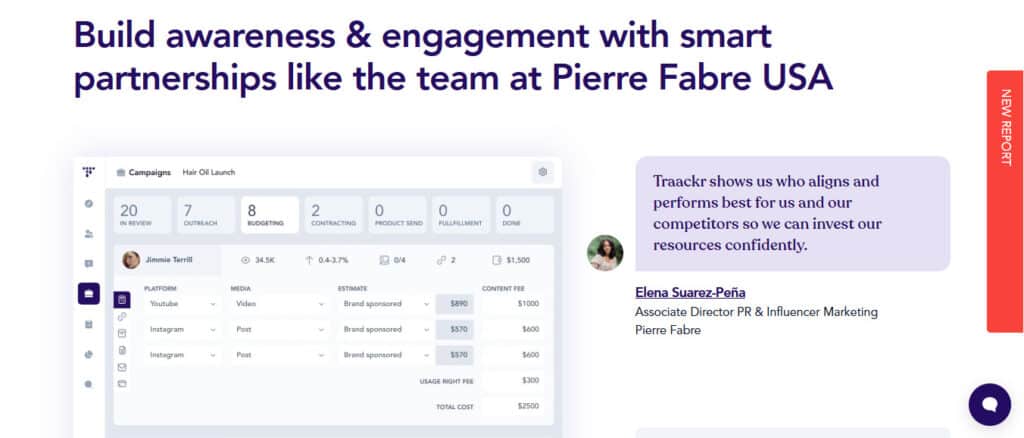
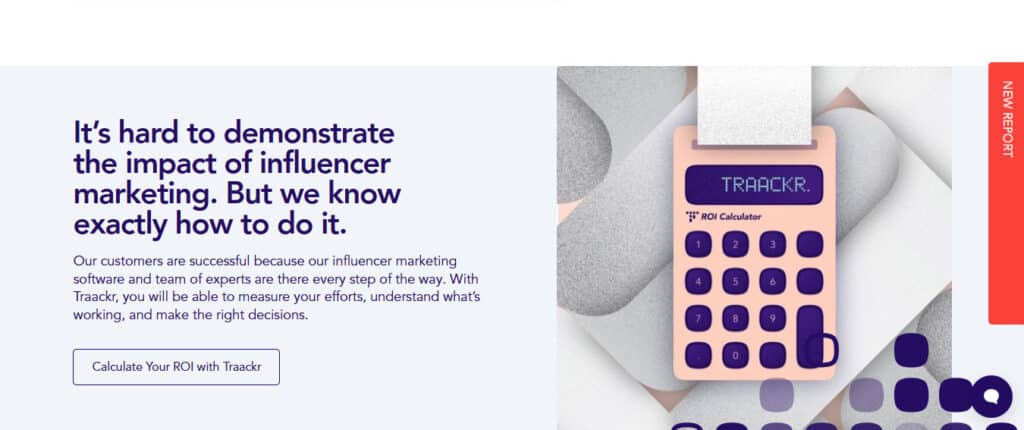
Features
- Influencer brand fit scoring
- Global compliance tracking
- Spend benchmarking
- Long-term relationship tracking
- Influencer ROI analysis
- Team collaboration tools
- Audience authenticity insights
Which LTK Alternative is Right for You?
Which LTK alternative is right for you comes down to what you’re trying to accomplish. If you’re focused on Amazon sales, Levanta is hands-down the best fit. Aspire.io will keep things streamlined for folks running a seeding program.
Need detailed analytics or brand safety? Go with Tagger or Traackr. From managing long-term influencer relationships with Grin to running complex, multi-channel campaigns with Upfluence, there’s a tool here for every goal and growth stage.
Levanta assembled this report to help digital merchants navigate the new AI-shaped buying journey. Discover why creators now drive the clicks AI can’t and how to turn that into revenue.


